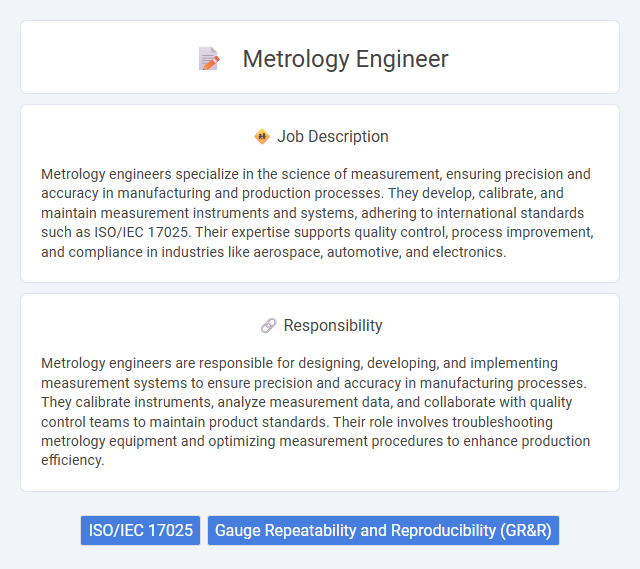
Metrology engineers specialize in the science of measurement, ensuring precision and accuracy in manufacturing and production processes. They develop, calibrate, and maintain measurement instruments and systems, adhering to international standards such as ISO/IEC 17025. Their expertise supports quality control, process improvement, and compliance in industries like aerospace, automotive, and electronics.
Individuals with strong analytical skills and a keen eye for detail are likely to thrive as metrology engineers, given the role's emphasis on precise measurements and quality control. Those who enjoy working with advanced technology and have patience for repetitive testing may find the job fulfilling and well-suited to their abilities. Conversely, people who prefer dynamic, less structured environments might struggle with the meticulous and methodical nature of metrology engineering.
Qualification
Metrology engineers require a strong foundation in mathematics, physics, and engineering principles, often supported by a bachelor's degree in mechanical, electrical, or manufacturing engineering. Proficiency in precision measurement techniques, familiarity with coordinate measuring machines (CMM), and knowledge of quality control standards such as ISO 17025 are essential qualifications. Advanced skills in data analysis software and experience with calibration procedures enhance their capability to ensure manufacturing accuracy and product quality compliance.
Responsibility
Metrology engineers are responsible for designing, developing, and implementing measurement systems to ensure precision and accuracy in manufacturing processes. They calibrate instruments, analyze measurement data, and collaborate with quality control teams to maintain product standards. Their role involves troubleshooting metrology equipment and optimizing measurement procedures to enhance production efficiency.
Benefit
A Metrology engineer likely enhances manufacturing accuracy, leading to improved product quality and reduced waste. They probably contribute to maintaining compliance with industry standards, which can boost company reputation and customer satisfaction. Their expertise may result in cost savings through optimized measurement processes and reduced downtime.
Challenge
Metrology engineers likely face significant challenges in maintaining precision and accuracy while adapting to rapidly evolving measurement technologies. They probably encounter complex problem-solving scenarios requiring advanced analytical skills to ensure quality control across various manufacturing processes. The role may demand constant updating of technical knowledge to stay ahead of industry standards and improve measurement systems.
Career Advancement
Metrology engineers specializing in precision measurement technologies often advance by acquiring expertise in advanced calibration techniques and quality management systems such as ISO 17025. Career progression typically includes roles like senior metrology engineer, quality assurance manager, or process improvement consultant, leveraging skills in data analysis and instrument validation. Continuous professional development through certifications from organizations like ASQ (American Society for Quality) significantly enhances opportunities for leadership positions in manufacturing, aerospace, and semiconductor industries.
Key Terms
ISO/IEC 17025
Metrology engineers specializing in ISO/IEC 17025 ensure that measurement processes meet international standards for testing and calibration laboratories, enhancing accuracy and reliability. They develop and maintain measurement systems, perform uncertainty analysis, and implement quality management protocols to comply with ISO/IEC 17025 requirements. Their expertise supports laboratory accreditation, ensuring traceability and repeatability of measurements critical to product quality and regulatory compliance.
Gauge Repeatability and Reproducibility (GR&R)
Metrology engineers specialize in Gauge Repeatability and Reproducibility (GR&R) studies to assess the precision and consistency of measurement systems used in manufacturing processes. They design and conduct GR&R experiments to quantify measurement variation caused by both the measurement device and the operators, ensuring reliable data for quality control. Expertise in statistical analysis and measurement system evaluation enables metrology engineers to optimize inspection methods and maintain compliance with industry standards.
 kuljobs.com
kuljobs.com